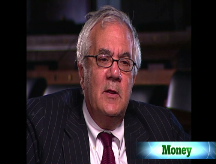Fannie and Freddie woes spread
The sharp decline in the value of preferred shares of the troubled mortgage finance firms could lead to billions of dollars more in bank writedowns.

NEW YORK (CNNMoney.com) -- The problems plaguing mortgage finance giants Fannie Mae and Freddie Mac could cause another big financial drain on banks.
Shares of Fannie and Freddie have plunged in recent weeks due to fears that the two companies may need to turn to the Treasury Department to raise more capital.
Some even speculate that Fannie and Freddie may wind up being nationalized, which would cause the stocks to lose most, if not all, of their value.
This is a problem for several banks since they own a big chunk of the estimated $36 billion in preferred shares of Fannie (FNM, Fortune 500) and Freddie (FRE, Fortune 500).
Preferred shares typically offer higher dividend payments than common stock and holders of the preferred shares would, in theory, be paid before common shareholders in the event of a government bailout.
The preferred shares have held up a bit better than the firms' common shares, which have lost about 90% of their value so far this year.
Still, many classes of the preferred shares are down 50% or more this year. Credit rating agency Moody's downgraded Fannie's and Freddie's preferred shares Friday, citing the risk of a government bailout.
And the sharp decline in value of these preferred shares could lead to billions in cumulative charges for the banks that own them.
For example, JPMorgan Chase (JPM, Fortune 500), the nation's No. 2 bank in terms of assets, disclosed on Monday that it owned about $1.2 billion in preferred shares of Fannie and Freddie. The bank warned that this investment had lost about half its value since the start of July.
So even if the slide in Fannie's and Freddie's preferred shares bottoms out at these levels, JPMorgan could still have to take a $600 million hit to its earnings in the third quarter.
Even so, this would probably not have a major impact on the bank. JPMorgan's $1.2 billion stake in Fannie's and Freddie's preferred shares represents just less than 1% of its tangible capital.
But smaller banks may face bigger problems.
A research note Monday from Keefe, Bruyette & Woods, an investment bank that specializes in financial firms, identified 38 other banks, mostly smaller regional banks, that between them hold about $1.3 billion in the preferred shares of Fannie and Freddie.
A few of those banks have already started to write down the value of those shares. Wilmington Trust (WL), a regional bank based in Delaware, took a $12 million charge related to holdings of Fannie and Freddie preferred shares in the second quarter. That contributed to the bank's $20 million loss in the period.
Most banks are likely to see an even bigger hit in future quarters though. Samuel Caldwell, an analyst with Keefe, Bruyette & Woods, said he was surprised by JPMorgan's exposure to Fannie and Freddie's preferred shares.
"We were only able to identify $1.3 billion in these holdings. It's entirely possible it's multiples of that number beyond held by other banks," he said.
Caldwell said he doubts the hits regional banks will have to take from the decline in Fannie and Freddie's preferred shares would cause widespread failures, although some could face severe capital problems.
But he added that it's likely that some of these smaller banks which own Fannie and Freddie preferred shares will have to pull back their lending activity.
Virginia Beach-based Gateway Financial Holdings (GBTS), has about 34% of its tangible capital tied up in Fannie and Freddie preferred shares, according to Caldwell. Just behind is Midwest Banc Holdings (MBHI), a suburban-Chicago bank with 32% of its capital tied up those shares. Neither of those banks, nor Wilmington Trust, responded to requests for comment.
The regional bank with the largest investment in the shares is Sovereign Bancorp (SOV, Fortune 500), a Philadelphia-based thrift which KBW estimates has Fannie and Freddie preferred shares originally worth $588 million, or about 13% of its tangible capital.
Kirk Walters, Sovereign's chief financial officer, said that even with his bank's relatively large exposure to Fannie and Freddie shares, Sovereign is not facing a capital shortfall of its own.
"Even in a worst-case scenario, we remain well capitalized and have a more than adequate cushion under all regulatory standards," he said in a statement.
The concentration of Fannie and Freddie preferred shares might be even more common among smaller, privately held banks, said Brian Gardner, another analyst with KBW.
Only a fraction of the nation's 8,500 banks and thrifts are publicly traded. For that reason Gardner believes the Treasury Department will try to make sure any government rescue of Fannie and Freddie protects preferred shareholders, even if common shareholders are wiped out.
"I think whatever Treasury is going to do, they're going to try to protect the preferred shareholders. The collateral damage done by wiping them out would create other problems," Gardner said.
But other analysts say if Fannie and Freddie do end up needing a cash infusion from the Treasury Department, there's no way that preferred shareholders won't see their investment hit further, if not completely wiped out.
Jaret Seiberg, a financial services analyst for Stanford Group, said he thinks the current administration will be reluctant to bail out preferred shareholders of Fannie and Freddie since such a move would be viewed as another bailout of banks while average shareholders lose their investments and homeowners face foreclosure.
"If a bank is taking the risk and getting the payout on the preferred shares, it's hard to make the argument they shouldn't suffer the loss," Seiberg said. ![]()




